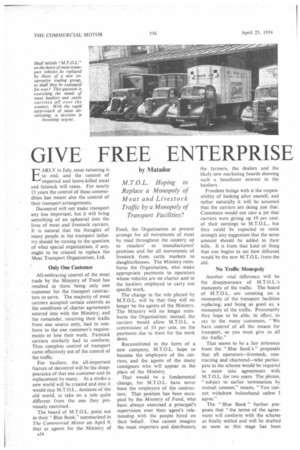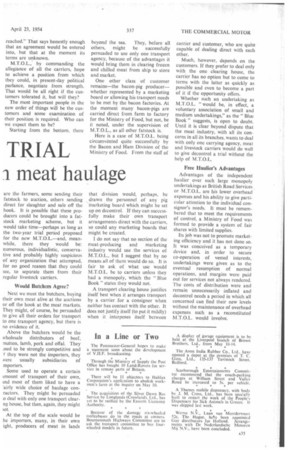GIVE FREE ENTERPRISE
Page 52

Page 53

If you've noticed an error in this article please click here to report it so we can fix it.
EARLY in July, meat rationing is to end, and the control of imported and home-killed meat and fatstock will cease. For nearly 15 years the control of these commodities has meant also the control of their transport arrangements.
Decontrol will not make transport any less important, but it will bring something of an upheaval into the lives of meat and livestock carriers. It is natural that the thoughts of many people in the transport industry should be turning to the question of what special organization, if any, ought to be created to replace the Meat Transport Organisation, Ltd.
Only One Customer All-embracing control of the meat trade by the Ministry of Food has resulted in there being only one customer for the transport contractors to serve. The majority of meat carriers accepted certain controls as the conditions of charter agreements entered into with the Ministry, and the remainder, receiving their traffic from one source only, had to conform to the one customer's requirements or lose their work. Fatstock carriers similarly had to conform. Thus complete control of transport came effectively out of the control of
the traffic. .
For hauliers, the all-important feature of decontrol will be the disappearance of that one customer and its replacement by many. At a stroke a new world will be created and into it would step M.T.O.L., denizens of the old world, to take on a role quite different from the one they previously exercised.
The board of M.T.O.L. point out in their" Blue Book," summarized in The Commercial Motor on April 9, that as agents for the Ministry of
A34 Food, the Organisation at present arrange for all movements of meat by road throughout the country up to retailers' or manufacturers' premises and for all movements of livestock from cattle markets to slaughterhouses. The Ministry reimburse the Organisation, who make appropriate payments to operators whose vehicles are on charter and to the hauliers employed to carry out specific work.
The change in the role played by M.T.O.L. will be that they will no longer be the agents of the Ministry. The Ministry will no longer reimburse the Organisation; instead, the carriers would allow M.T.O.L. a commission of 10 per cent. on the payments due to them for the work done.
Reconstituted in the form of a new company, M.T.O.L. hope to become the employers of the carriers, and the agents of the many consignors who will appear in the place of the Ministry.
That would be a fundamental change, for M.T.O.L. have never been the employers of the contractors. That position has been occupied by the Ministry of Food, who have always exercised a principal's supervision over their agent's relationship with the people hired on their behalf. One cannot imagine the meat importers and distributors, the farmers, the dealers and the likely new marketing boards showing such a beneficent interest in the hauliers.
Freedom brings with it the responsibility of looking after oneself, and rather naturally it will be assumed that the carriers are doing just that. Customers would not care a jot that carriers were giving up 10 per cent. of their earnings to M.T.O.L., but they could be expected to resist strongly any suggestion that the same amount should be added to their bills. It is from that kind of thing that one begins to see how different would be the new M.T.O.L, from the old.
No Traffic Monopoly
Another vital difference will be the disappearance of M.T.O.L.'s monopoly of the traffic. The board of M.T.O.L. are counting on a monopoly of the transport facilities replacing, and being as good as, a monopoly of the traffic. Presumably they hope to be able, in effect, to say to the many customers, "We have control of all the means for transport, so you must give us all the traffic."
That seems to be a fair inference from the "Blue Book's" proposals that all operators—livestock, contracting and chartered—who participate in the scheme would be required to enter into agreements with M.T.O.L. for two years. The phrase, "subject to earlier termination by mutual consent," means, "You cannot withdraw beforehand unless I agree."
The "Blue Book" further proposes that "the terms of the agreement will conform with the scheme as finally settled and will be drafted as soon as this stage has been
reached." That says honestly enough that an agreement would be entered into, but that at the moment its terms are unknown.
M.T.O.L., by commanding the allegiance of all the carriers, hope to achieve a position from which they could, in present-day political parlance, negotiate from strength. That would be all right if the customers tolerated it, but will they?
The most important people in the new order of things will be the customers and some examination of their position is required. Who can we expect them to be?
Starting from the bottom, there beyond the sea. They, before all others, might be successfully persuaded to use only one transport agency, because of the advantages it would bring them in clearing frozen and chilled meat from ship to store and market.
One other class of customer remains—the bacon-pig producer— whether represented by a marketing board or allowing his transport needs to be met by the bacon factories. At the moment many bacon-pigs are carried direct from farm to factory for the Ministry of Food, but not, be it noted, under the supervision of M.T.O.L., as all other fatstock is.
Here is a case of M.T.O.L. being circumvented quite successfully by the Bacon and Ham Division of the Ministry of Food. From the staff of carrier and customer, who are quite capable of dealing direct with each other.
Much, however, depends on the customers. If they prefer to deal only with the one clearing house, the carrier has no option but to come to terms with the latter as quickly as possible and even to become a part of it if the opportunity offers.
Whether such an undertaking as M.T.O.L. "would be, in effect, a voluntary association of small and medium undertakings," as the "Blue Book" suggests, is open to doubt. Until it is clear beyond dispute that the meat industry, with all its concerns in all its branches, wants to deal with only one carrying agency, meat and livestock carriers would do well to give decontrol a trial without the help of M.T.O.L.




















































































